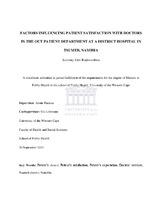| dc.contributor.advisor | Parsons, Annie | |
| dc.contributor.advisor | Lehmann, Uta | |
| dc.contributor.author | Rutabanzibwa, Juvenary John | |
| dc.date.accessioned | 2017-03-22T09:33:13Z | |
| dc.date.available | 2017-03-22T09:33:13Z | |
| dc.date.issued | 2011 | |
| dc.identifier.uri | http://hdl.handle.net/11394/5408 | |
| dc.description | Master of Public Health - MPH | en_US |
| dc.description.abstract | Providing quality health services is a concept currently given a high priority by the World Health Organization (WHO). As a member of WHO, Namibia is determined to improve health services delivery in the country. In order to achieve this, both doctors and patients must fully engage in the planning and implementation of health services. There have been long standing complaints from patients attending Tsumeb district hospital in Namibia about unsatisfactory services from doctors. The Regional Health Management Team and District Coordinating Committee have tried to make sure that all essential services required at the district hospital are in place and functional. Despite these measures, some patients continue to express dissatisfaction with the services provided by doctors. The aim of this study was to describe factors considered by patients in choosing a doctor at Tsumeb district hospital Outpatient department. The research was an observational descriptive cross-sectional study. Data was collected using a structured questionnaire administered by the researcher in interviews to a sample of 235 patients attending the Tsumeb Out Patient Department over five weeks. Data was analyzed using Epi-Info computer software. Approval to conduct the research was sought from the Namibian Ministry of Health Research Ethical Committee and Regional Health Management Team prior to commencing the study. Study participants received full information on the purpose and process of the study in their preferred language and were allowed to withdraw at any stage without consequences. All data was made anonymous and securely stored. The majority of the study sample (90 percent) did not have a tertiary level of education. Although a majority of the study sample (80 percent) said there were long waiting times at Tsumeb hospital Out Patient Department and 48 percent indicated that the environment at Tsumeb hospital was unfriendly, a significant percent of patients surveyed (38.3 percent) were present for follow-up care. This could be attributed to patients who attend Tsumeb hospital being of low socio-economic status and hence having a limited choice of health services, or it could suggest that overall patients were satisfied with the doctors they saw, as 67 percent of returning patients agreed with the statement that Out Patient Department doctors are competent. Four participants complained about the lack of confidentiality among nurses, an issue that was not part of the original questionnaire. In order to improve the quality of patient care, there is a need for the Tsumeb hospital authority to address key complaints around waiting times and staff attitudes. | en_US |
| dc.language.iso | en | en_US |
| dc.publisher | University of the Western Cape | en_US |
| dc.subject | Namibia | en_US |
| dc.subject | Tsumeb District (Namibia) | en_US |
| dc.subject | Doctors' services | en_US |
| dc.subject | Patient's satisfaction | en_US |
| dc.title | Factors influencing patient satisfaction with doctors in the Out patient department at a district hospital in Tsumeb, Namibia | en_US |
| dc.rights.holder | University of the Western Cape | en_US |

